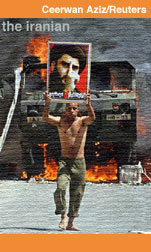 Reality bites Reality bites
The dominoes of the Iraqi invasion
By Ahmad Sadri
April 5, 2004
iranian.com
How many times must the dominoes not fall before the metaphor
is forever banned? The neoconservative plans for the pacification
of the Middle East were hatched in right-wing think tanks of
Washington. They sprang forth fully armed from the forehead of
President
George W. Bush's Administration in the form of the Iraqi invasion,
once terrorism had delivered the blow of the Hephaestus' axe.
The excuse of fighting terrorism was later replaced with that of
searching
for weapons of mass destruction but the logic of the grand plan
remained the same: dominoes would fall. Obviating former Iraqi
President Saddam Hussein would destabilize Iran and Syria, setting
the stage for other invasions or else weaken the undesirable regimes
and set them up for internal rebellions. At the very least, the
invasion of Iraq would provide the hard-liners in these countries
with an object lesson. The human face of the invasion was also
forged in the crucible of the domino theories. One democracy would
beget other moderate, secular and pro-Western democracies and a
peace loving Middle East would seek the path of accommodation with
Israel.
The serial invasions never came about. The Iranian hard-liners
did learn an object lesson from the invasion of Iraq, but not the
one intended by Washington's tough pedagogues. From the beginning
of the Iraqi invasion it was plain to Iran's ruling mullahs that
the US would not go for a second helping of hard-to-digest regional
politics. Hence, the Iranian right-wingers quickened the pace of
their subversion of the democratic elements of the Iranian polity.
In implementing their slow motion coup d'etat the hard-liners relied
on the inability and unwillingness of the US to intervene. More
importantly, they banked on the public fear of the Iraqization
of Iran.
Some reform analysts have suggested that the fear of foreign
intervention was partly responsible for higher than expected voter
participation in the recent parliamentary elections that had been
openly rigged by the widely disliked right-wing. The emerging three
headed hound of the neo-right-wing Iranian parliamentary majority
is one of the unintended consequences of the Iraqi invasion. These
days, the practical head of the beast chatters on about "Japanizing"
Islamic Iran while the military and crony-capitalist
heads pledge to roll back reforms and pursue an Islamist foreign
policy.
Of course, not all dominoes fall the wrong way. It is undeniable
that the invasion of Iraq, its costs to US taxpayers and national
interests notwithstanding, did get rid of a hated tyrant. Despite
its current doldrums, the post-Saddam Iraq faces new opportunities.
A democratic Iraq has a chance to take stock of its collective
interests, or at least try to establish the infrastructures necessary
to forge a general will out of its multiple ethnic and religious
communities. Yet, there was never any doubt (even in Washington)
that the liberation of Iraq would raise new questions of stability
and national integrity that were moot under Saddam's iron rule.
To take one case: it was inevitable that the Shiite majority,
with its long history of resistance against occupiers, would ask
for
a larger share of the political power. Although the religious leadership
of the Iraqi Shiites under Grand Ayatollah Ali Sistani follows
a traditional and quietist political philosophy (that does not
allow the establishment of an Islamic state in absence of the occulted
imam) the political circumstances might have already made an activist
out of Sistani. The fact that some have started to bestow the title
of "imam" on Sistani is an alarming development as the Shiite theology
has traditionally reserved that title for the original imams: the
12 infallible ones. Before Sistani, only Musa Sadr of Lebanon and
Ruhollah Khomeini of Iran had been given the title indicating an
Islamist mutation of the Shiite theology.
In Iraq, as in Lebanon in the 1970s, the radicalization of the
Shiites gathers pace with the increase of external threats. It
is no secret that Al-Qaeda wishes to stoke the fires of an intra-religious
holy war in Iraq to frustrate US attempts at state building in
that country. Indeed, decades of Wahhabi propaganda against the "Shiite
heresy" have created a fertile ground (both in Iraq and in
neighboring Arab countries) for Al-Qaeda's atavistic (salafi) bid
for a religious war against the Shiites. Suicide bombings at holy
sites and threats against the life of Ayatollah Sistani are the
opening salvoes in terrorists' war plan.
The realities of the occupation
of Iraq do not lend themselves to simple and optimistic tropes.
The suggestion that the invasion
of Iraq made the US more vulnerable to the threat of Islamist
terrorism is slowly entering the mainstream of American consciousness.
The
pleasant clatter of the falling dominoes in the wake of an Iraqi
invasion is slowly drowning, among other things, in the recent
testimonies in the congressional committee that is charged with
investigating the US response to the events of Sept. 11, 2001.
.................... Say
goodbye to spam!
Author
Ahmad Sadri is Professor and Chairman of the Department
of Sociology and Anthropology
at Lake Forest
College, IL, USA. See
Features .
See Homepage
*
*
|